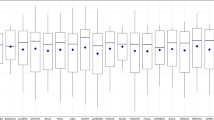Abstract
The article presents a methodology for analyzing the perception of a situation on the basis of digital data using the social stress and well-being indices. The material for the study is data from social networks, microblogs, forums, blogs, video hosting sites, reviews on the construction of road transport facilities in Moscow (South-East Chord, Southern Beltroad (Reconstruction of Verkhniye Polya Street between Maryinsky Park Street and the Moscow Ring Road), North-East Chord). The study involves a cross-disciplinary approach. To interpret the content, neural network text analysis, content analysis, sentiment analysis and analysis of lexical associations were used. Social media data made it possible to conduct real-time analytics, analyze users’ perceptions and obtain a forecast on the further development of the situation around the analyzed urban development projects. The social stress and social well-being indices made it possible to characterize the communicative situation, taking into account the level of conflict potential and the dynamics of digital aggression, to identify the critical points in the conflict development and to determine the degree of the actors’ satisfaction with the course of construction.
Access this chapter
Tax calculation will be finalised at checkout
Purchases are for personal use only
Similar content being viewed by others
References
Selye, H.: Stress without distress. In: Serban, G. (eds.): Psychopathology of Human Adaptation. Springer, Boston, MA (1976)
Fink, G. (ed.): Encyclopedia of Stress, 1st edn. Massachusetts, Academic Press, Cambridge (2000)
Steinberg, C.E.W.: Stress Ecology. Environmental Stress as Ecological Driving Force and Key Player in Evolution. Springer Netherlands, Cham (2012)
Leik, R.K., Chalkley, M.A.: On the stability of network relations under stress. Soc. Netw. 19, 63–74 (1997)
Kaplan, H.: Psychosocial Stress. 1st Edition. Trends in Theory and Research. Cambridge, Massachusetts, Academic Press (1983)
Elsevier: The Current Health and Future Well-Being of the American Research University (2013). https://www.elsevier.com/research-intelligence/resource-library/the-current-health-and-future-well-being-of-the-american-research-university. Accessed 21 Mar 2021
Turner, H., Schieman, S. (eds): Stress Processes across the Life Course, vol. 13. 1st edn. JAI Press, Stamford, CT (2008)
Fink, G.: Stress: Concepts, Cognition, Emotion, and Behavior. 1st. edn. Handbook of Stress Series (1), Cambridge, Massachusetts, Academic Press (2016)
Park, H.: The Death of Big Data and the Productivity and Happiness at Work. Palgrave Macmillan, London (2019)
Bradburn, N.M.: The Structure of Psychological Well-Being. Aldine Publishing Company, Chicago (1969)
Haworth, J., Hart, G. (eds.): Well-Being Individual, Community and Social Perspectives. 1st. edn. Palgrave Macmillan, London (2007)
Pollock, G., Ozan, J., Goswami, H., Rees, G., Stasulane, A. (eds.): Measuring Youth Well-being. CWIR, vol. 19. Springer, Cham (2018). https://doi.org/10.1007/978-3-319-76063-6
Robertson, I., Cooper, C.: Well-being. Productivity and Happiness at Work. Palgrave Macmillan, London (2011)
Diener, E. (ed.) The Science of Well-Being: the Collected Works of Ed Diener. Springer Netherlands, Cham (2009)
Elsevier: Social Stress + Darkness = Increased Anxiety. ScienceDaily 24 October 2007. www.sciencedaily.com/releases/2007/10/071023090104.htm. Accessed 21 Apr 2021
Kullkarni, V., et al.: Latent human traits in the language of social media: an open-vocabulary approach. PLOS One, 13(11) (2018)
Kharlamov, A., Pilgun, M. (eds.): Neuroinformatics and Semantic Representations. Theory and Applications, Cambridge Scholars Publishing: Newcastle upon Tyne (2020)
Bandura, A., Barbaranelli, C., Caprara, G.V., Pastorelli, C.: Mechanisms of moral disengagement in the exercise of moral agency. J. Pers. Soc. Psychol. 71(2), 364–374 (1996)
Author information
Authors and Affiliations
Corresponding author
Editor information
Editors and Affiliations
Rights and permissions
Copyright information
© 2023 The Author(s), under exclusive license to Springer Nature Switzerland AG
About this paper
Cite this paper
Kharlamov, A.A., Pilgun, M. (2023). Perception of the Situation: Social Stress and Well-Being Indices. In: Arai, K. (eds) Intelligent Systems and Applications. IntelliSys 2022. Lecture Notes in Networks and Systems, vol 544. Springer, Cham. https://doi.org/10.1007/978-3-031-16075-2_57
Download citation
DOI: https://doi.org/10.1007/978-3-031-16075-2_57
Published:
Publisher Name: Springer, Cham
Print ISBN: 978-3-031-16074-5
Online ISBN: 978-3-031-16075-2
eBook Packages: Intelligent Technologies and RoboticsIntelligent Technologies and Robotics (R0)




